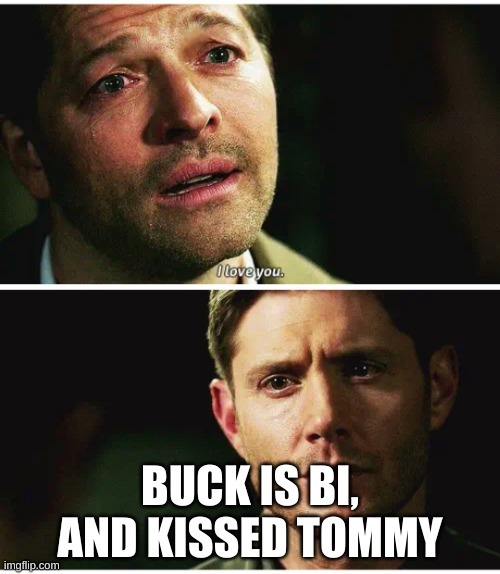#sorry I know this has been done before
Text
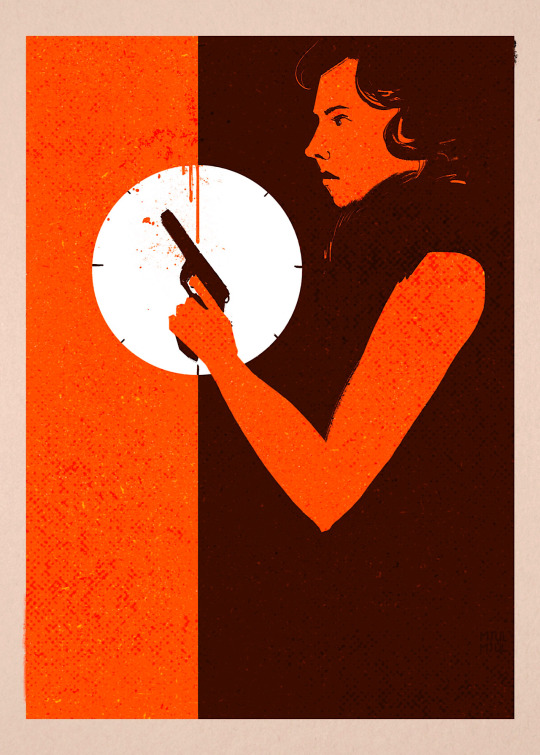
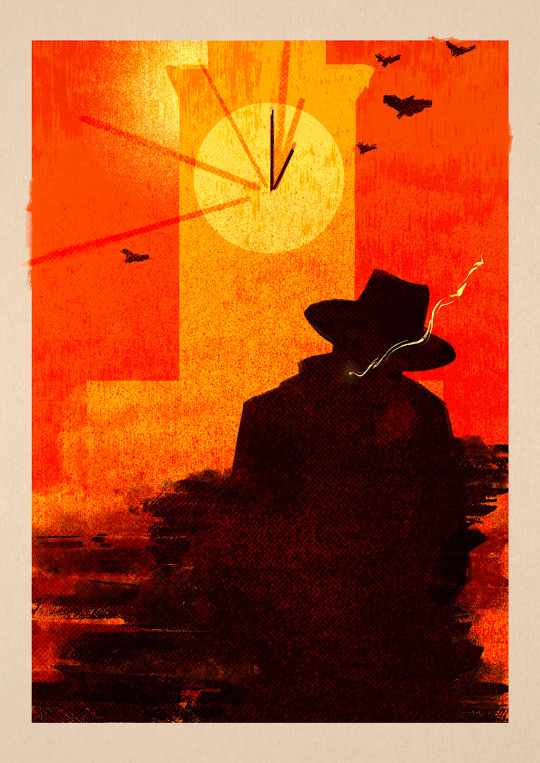
Katya / Goncharov
#yeah ik ive posted them before sorry but i REALLY like how these look together#martin scorsese#goncharov#artists on tumblr#illustration#unreality#<— posters for a ‘movie’ that doesn’t actually exist but is a tumblr meme in which everyone pretends it does&makes content for it#fascinating how we’re immediately personable w katya by knowing her first name while only knowing goncharov’s surname keeps us at a distanc#combined with him being the only major character to go by a moniker it emphasizes just how much he's been consumed by the role he plays#who is goncharov? does he know and keep it secret? or has he too lost his sense of identity?#it's reflected in these posters as we SEE katya but goncharov remains elusive - yet clearly time is running out for them both#lakjdklf ok im done now i never post meta on here so im having fun with the fictional movie#btw I updated both of the illustrations compared to the original posts but will leave those as they were#woudl be cool if my post showed up. u can do it tumblr
21K notes
·
View notes
Text
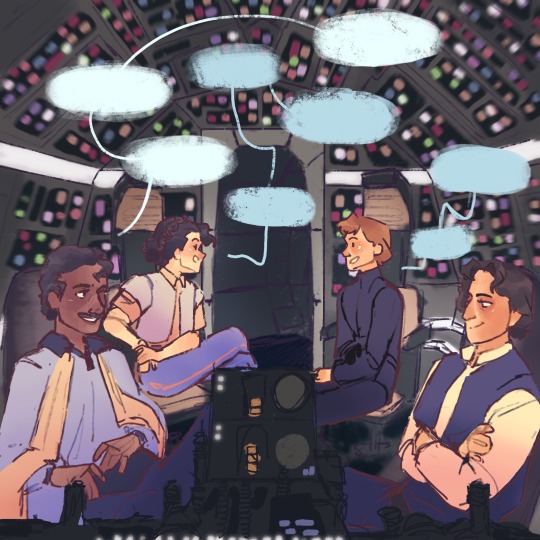

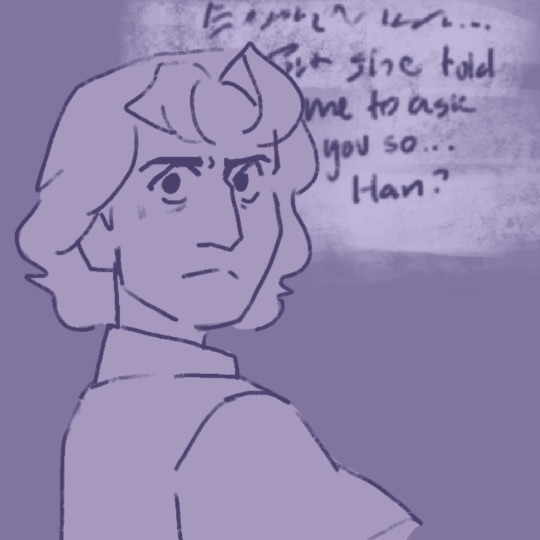


When did it happen?
#Drama Comic December!!#sorry I’ve been so sporadic with posting this semester is kicking my ass apparently!!#(this is the best I’ve ever done tho dw I’m slaying)#anyways the girlies!#this takes place uhh#before Endor#that’s all I got#also imagine coming out of cryo sleep and everything you know has changed#fucked up fr#like your besties are changed and you have no idea why#(one’s pretending like her planet hasn’t blown up and the other is getting taught emotions are bad)#art#fanart#digital art#fan art#my art#star wars#star wars fanart#sw#sw fanart#leia organa#luke skywalker#han solo#lando calrissian#rotj#sw rotj#return of the jedi
1K notes
·
View notes
Photo
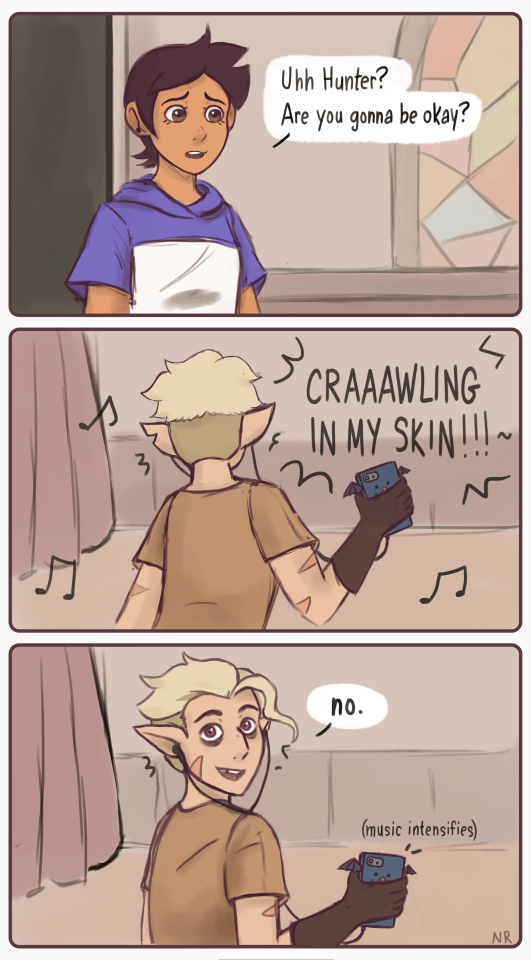
My brain wouldn’t let me sleep until I drew this, so now this exists
#the owl house#toh#toh hunter#luz noceda#luz toh#I dont know how to make comics#do I tag steven universe?#comic#NRart#hunter#luz#fanart#has this been done before? If yes then sorry
14K notes
·
View notes
Text
i thought the intro drawings they slide over where cool so i cut and paste them together into one

and the other one

originally i wanted to make a full one but as it turns out the images don't seemlessly connect to each other and i have standarts dammit
#i don't know if this has been done before#sorry if you did this before and feel like i made your effort obsolete#i don't know if that's how words work#intro art#intro art dunmeshi#intro art dungeon meshi#intro#intro dungeon meshi#dungeon meshi#dunmeshi#dunmesh#falin touden#falin dungeon meshi#marcille donato#marcille dungeon meshi#laois touden#laois dungeon meshi#chilchuck#chilchuk tims#chilchuck dungeon meshi#falin#marcille#laois#touden#senshi dungeon meshi#senshi#dungeon crawler#food#anime#art
485 notes
·
View notes
Text

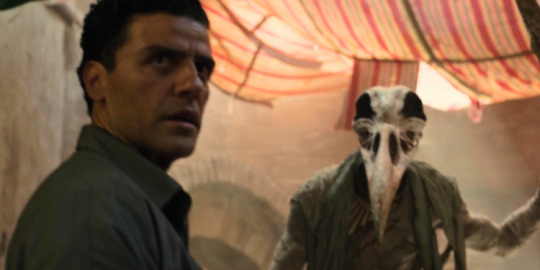
#im sorry#marc spector#marc spector edit#moon knight#moon knight edit#oscar isaac#oscar isaac edit#q#has this been done before? i don't know if i have new thoughts anymore of it they are just recycled#my stupid edit#(affectionate)#moon knight meme#moon knight memes#moon knight text post#moon knight text posts#moon knight mcu#khonshu#khonshu edit
240 notes
·
View notes
Text

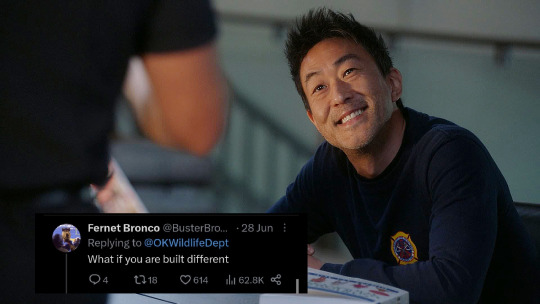
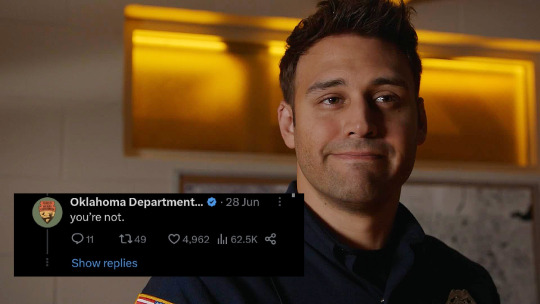
mr lafd updates man is not impressed
#AKFAKKFASLDK YOU KNOW I HAD TO#eddie diaz#911#911 abc#911 fox#911edits#mr lafd updates man#memes#if this has been done before im sorry#incorrect quotes#incorrect 911 quotes
1K notes
·
View notes
Text

What if I straight up didn't explain myself? What if I just said trust me on this? Would you?
#fe warriors three hopes#mercedes von martritz#miklan anschutz gautier#we really only need to clarify this is STRICTLY warriors miklan and i think ive already condemned myself but i accept it#i am very sorry but the person i usually would talk to about rare pairs has been a bit busy so i couldnt go to them to get it out that way#so art is the only way i have you have to understand its not my fault (its my fault)#did you guys know i reset the azure gleam map three times before googling the chapter where he dies to try and save him#no i dont think he deserves to be pardoned for what hes done but i liked that w3h gave him a small chance to be better FOR HIMSELF#no i dont think he should simply be forgiven for everything he did but i do like that he was given humanity and how#he was still not a good guy but damn you guys i think about that npc sometimes#who says that they admired him becoming something despite being a criminal bc if miklan can do it whats stopping them from being better ?#like that npc stuck with me a while ok#just ......... there are a lot of thoughts here that i dont think many of you care to read even in tags so ill stop now#i will say the canvas is saved as speed run to cancellation lesgo
239 notes
·
View notes
Text
Him: “how’s my favorite girl?”
Me: …….🥺😳🫣😍🥰😍🥰🥰😍🥰😘🥰🥰😍🥰😘🥰😍🥰😍😘🥰🥰😍😘🥰😍😘🥰😍😘😍🥰😍😍😘
#don’t mind me#just thinking about my future bf/loml#and all the cute things they are going to say to me#to make me swoon and fall head over heels for them#and it’ll be their favorite thing to make me blush#so they’ll always want to outdo themselves#say something a little different and out of the blue to see me go#🥺🫣🫣🫣🫣#I’ll try to hide my face and they’ll just grab my hand instead#‘you can’t hide your cute face from me’#‘don’t you know???? you’re mine’#guys I’m not ok#I’m thinking some super cute thoughts#and I want them now pls 😤#rosie speaks#also idk if this has been done before so sorry if it has?????#I just really want to be someone’s favorite girl 😤
4K notes
·
View notes
Text
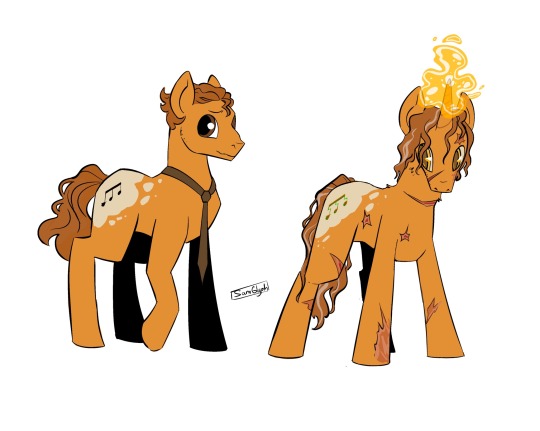
Arthur. Why are you a horse
[Id in alt by @/lolgmalolg-did-nothing-wrong]
#I know this has been done before but I can’t find it I’m sorry#anyway I drew this while watching the bear so make of that what you will#malevolent#my art#malevolent podcast#arthur lester#I have not drawn a pony since like middle school
392 notes
·
View notes
Text
Do you guys think SeaWings have folklore based on hearing those eery glacier sounds underwater? Like Julia or the bloop (i hope i remembered those names right)
Like do you think Seawings heard that underwater and thought it was some kind of dragonet-snatching boogieman?
And since it would only happen once (or rarely) the old Seawings would keep warning about it and tell stories of it and the younger generations would be like „pssshz yeah right tahts just a story told to missbehaving dragonets“ and then it happens again and everyone freaks out????
#sorry if this has been done before#a post about seawing language made me spiral#do you think icewings would someday explain zhe noise to them?#or would Icewings also not know where the sound is from?#etc etc#idk guys#pitskederdoenerhaendler#wings of fire#wings of fire headcanons#wof#wof headcanon#wof hc#wings of fire hc#wof seawing#wings of fire seawing#i‘m gonns look so stupid if someone tells me this is in teh books cause I just haveng read them all yet
89 notes
·
View notes
Text
Before the semester kicks off and murders me, @disniq asked for my essay on Jason Todd and hysteria. So, without further ado, here is an actual essay (fucking dissertation) because I refuse brevity. It is extremely long. I’ve split it into sections so you can find the section header and read what you want. This does not encompass all the narrative trauma themes and lived experiences that this boy holds, just specifically hysteria.
Jason Todd, The Hysteric & Bruce Wayne, The Batman
I think it’s a common reading that Jason Todd is girl-coded and the patron saint of victims, at least within the circle that I’ve fallen into within this fandom. There are plenty of meta discussions on why those readings stand, so I’m not going to reiterate them. A pillar of him being girl-coded and someone trauma survivors have latched onto as one of our own has to do with being written in the context of hysterical femininity. And let me just say, I don’t think that writing was done in a way that he was intentionally coded as hysterical, but it is a function of our patriarchal society that this coding was used on him albeit without the explicit purpose of writing a hysteric story.
For the purpose of this post: the word woman includes ciswomen, transwomen, and any person who is socially positioned as a woman regardless of gender identity. I include the positionality here because anyone can experience misogyny and sexism depending on the perception of the perpetrators either interpersonally or systemically.
The History and Context of Hysteria
To understand the context, we have to look at the history and oppression of hysteria. Hysteria (in the modern context of psychology) emerged in the nineteenth century and is difficult to define by design and often applied to traumatized, unruly, and broken women. The main patriarchs who contributed to hysterical study were Jean-Martin Charcot and Sigmund Freud. I only mention this because it’s important to know their names moving forward for any of this to make sense. The beginning of this started with Charcot literally putting women whose lives had been marked by rape, abuse, exploitation, and poverty on display in his Tuesday lectures (which were open to the public) to show his findings on hysteria. This was actually seen as restoring dignity (fucking yikes) to the women because before Charcot these hysterical women were cast aside and not treated at all. In Charcot’s work, the women’s speech was seen as simply “vocalization” and their inner lives, their stories, their words, were silenced. After hearing a woman cry for her mother during one of the public sessions Charcot remarked, “Again, note these screams. You could say it’s a lot of noise over nothing” (Herman).
This led to Freud, Charcot’s student, wanting to surpass his teacher by discovering the cause of hysteria. This was disastrous. Freud started with listening to the hysterics. In doing so, he learned and believed them about the abuse, rape, and exploitation of their pasts. He then published his work and gave a lecture on it. The work rivals even contemporary psychological work on trauma in it’s level of compassion, understanding, and treatment of survivors. However, he was then labeled a feminist (this was all happening during the first wave of feminism) and professionally ostracized. How in the world could these aristocratic French men be sexually abusing their wives, sisters, and daughters??? Insanity, truly. And... This always fucking gets me. He recanted his work and then told his patients they all imagined it because they wanted to be sexually abused by their husbands, brothers, and fathers. This set back the study of trauma by literally a century. One colleague called his work “a scientific fairy-tale” simply because he had the audacity to believe victims. Also, I want to point out that the famous hysteria case during this time was the case of Anna O and she was ultimately villainized by the entire psychological community for going into crisis after her care provider abruptly ended their therapeutic relationship after two years of DAILY sessions.
Anyway. We can see how the power of these men over vulnerable women silenced, pathologized, villainized, infantilized, and used male ‘logic’ to completely destroy their credibility and lives under the guise of care and hysteria. Even when credible men lend their expertise and voices to the victims, their voices are silenced. This particular iteration of hysteria lasted over a century, and we are still dealing with the consequences of these actions and ideas within our social construction, medical and mental health care, interpersonal relationships, and more. Patriarchal pillars such as hysteria don’t die. We saw it move from hysteria to schizophrenia (which used to have the same symptoms of hysteria before the diagnosis changed in more contemporary psychology) after this which led to widespread lobotomies and electroshock therapy (my least favorite case of a lobotomy being done is on a woman who was diagnosed with LITERALLY ‘narcissist husband’) to depression in the 40s-50s with the over prescription of benzodiazepines to house wives to keep them in a zombie state (these prescriptions were sometimes double and triple what we take today with the intent of medical catatonia). In my opinion, as well as other counselors within the feminist therapy theoretical orientation, we are currently seeing it with the emergence of borderline-personality disorder. Think about how BPD is treated and demonized for a second. I professionally know therapists who refuse to work with BPD clients due to this villainization and just fucking gross perception of victims.
These are just the highlights, but it shows the history of hysteria. There have been centuries of women being marked as hysterical and the cures have ranged from lobotomy to bed rest (which sounds not so bad but read the Yellow Wallpaper and get back to me on that one). While the Yellow Wallpaper is fictional, the life behind it was not. After the traumatic birth of her child the author, Charlotte Perkins Gilman, was remanded to bed rest by the authority of her husband and doctor. Within the sphere of medical control, hysterical women are often treated as children while their doctors make decisions for their mental well-being without consulting them, or they hide the truth of their procedures for “the woman’s own good” and because “she’s hysterical and wouldn’t comprehend the logical need for this.” She then had a mental break due to the treatment. Again, we see hysterical women being silenced, infantilized, discredited from their own experiences, and under the narrative control of male logic and voices.
Hysterical women have often historically been seen as beneath men, except for when they’re dangerous. Listening to victims is inherently threatening to the status quo because all trauma comes from a systemic framework. The framework that upholds patriarchal power. It’s easy to see why that would be seen as dangerous to powerful men. We saw this with the European witch genocide in which oppressed women were targeted and wiped out under the excuse of what was considered women’s work. (Before this time, witchcraft wasn’t tied to any religion and was mostly just seen as women’s work. It was targeted specifically to have an excuse to persecute widows, homeless, disabled, and vulnerable women who no longer had men to reign over them during a time of political unrest and scarce resources). This time period saw hysterical and traumatized women demonized as dangerous, evil, immoral, hypersexual, and supernaturally wily. A threat to the moral fabric of society.
(Interesting history side note: this caused the view of women’s base traits we have today. It stemmed from the Victorian era that came after this time period in which women learned if they behaved a certain way, they would be spared the stake. For example, before the witch trials, women were actually seen as the ones with unsatiable sexual appetites, something we culturally prescribe to men now.)
Notice how none of this has to do with the actual abuse that happens to the women, but instead the labeling and treatment of women when they are already showing the symptoms of abuse, trauma, control, exploitation, and rape.
Jason Todd, The Hysteric
So, how does this relate to Jason Todd? To say that Jason has experienced trauma would be an understatement. Extreme poverty, loss of parent to death and addiction, loss of parent to the justice system, parental abuse, manipulation, witnessing violent crimes, witnessing the aftermath of sexual abuse and assault, arguably (not explicit in the text) his own sexual trauma, witnessing the dead bodies of victims, a violent death, and subsequently a violent resurrection. There’s also an argument to be made for being a child soldier and how that is romanticized up until he dies, but the text does not treat this as traumatizing.
Now, I’m not going to dive into the trauma he experienced. The purpose of this is only to look at how he’s framed as hysterical in the narrative, and as I stated, hysteria was a word slapped on women after they tried to talk about their trauma or exhibited symptoms (or were just unruly women). Jason does embody many facets of the victim experience and this is just one of them.
Feelings vs “logic” - Firstly, it is really hard to talk calmly about things that you carry, your experiences, your trauma, and things that specifically harm you. It is easy to talk calmly about things that don’t. This is why there is an abuse tactic of gaslighting or silencing victims by framing their very real reactions to harm or their triggers as abuse, this is known as “reactive abuse.” This tactic is also employed in oppressive settings where the privileged group will often default to ‘winning’ a debate by being able to remain calm while the marginalized group whose life, personhood, etc is being harmed by the things being discussed and are unable to have a sterilized, emotionless debate.
Both of these settings fit Jason nicely within the moral context of vigilante comics. He fought back, he didn’t lay down, and he will do what he deems as necessary to protect himself and others from his fate. This, however, is framed by Bruce and others as being just as bad as his murderer or even just as bad as Joe fucking Chill. To put this in perspective of a real world equivalent. Combine every billionaire on this planet into one person and instead of their shitty business practices murdering people, they did it with their own two hands. And due to their resources and political power, they would never, ever stop killing or be reasonably contained. More people would die with absolute 100% certainty. Would killing that one person make you equally bad as that person or violating the sanctity of life? That’s the moral question that Bruce puts onto Jason. While the moral question inherent to Jason is actually, is there a line worth crossing to provide reasonable safety (for yourself or the nameless community)? There is actually a difference between those two questions and the reactive abuse framing is certainly a choice. Also, it is funny to me that a man with the amount of power Bruce has (and frequently misuses) can lecture a murder victim on the misuse of power and morality. Are we supposed to be agree with his stoic, philosophical lecturing to a marginalized, abused, murder victim? (yes, we are). Bruce leverages (personal) philosophy against victim’s voice for their own safety, and take a wild guess which one is framed as logical and reasonable.
Jason’s morals come secondary to Bruce’s philosophy in a universe where there is still harm being done (but it’s an acceptable harm). Why is killing the line? Bruce is regularly destroying families and lives by feeding them into the prison industrial complex while supporting it with his whole chest. Or he’s disabling and seriously maiming people with the level of violence he uses.
Crying - Throughout the entire story of Under the Red Hood, we never once see Bruce emote while interacting with Jason outside of tight grimaces. With the exception of the shock he shows at the Joker’s life being threatened, which... Okay, suuure. We never see him cry during any of their interactions, but we do see Jason cry. Specifically, we see him crying when he’s at his most emotionally vulnerable and physically dangerous to the toxic male power fantasy. This kind of vulnerability is rarely shown by male characters, and when it is, it’s usually done with a mist of a tear in their eyes or their face is hidden. There are a few narrative devices that allow men to cry, but they are the exception rather than the rule. Usually, it’s to play for laughs, infantilize, or emasculate. Here, we see Jason combine the violence of a bad victim, bucking the system of power, and fully crying. Just slide right into that hysterical coding like a glove. Jason often shows his feelings entirely. Time and time again, the readers have seen Jason have breakdowns, cry, and be overcome with grief. This is tied to his portrayal as hysterical and unstable in the narrative, but in actuality it shows his capacity for love and how vastly impactful his death was.

This fits nicely with the next point that Jason fits into the hysterical box. Love is framed as one of his key faults. A son reaching for his father.

Love - One of Jason’s defining features is the amount of love and compassion he holds. He’s willing to put up with any treatment, shoulder blame, and sacrifice himself for others to almost an unhealthy degree. However, this doesn’t extend to what he defines as his baseline safety. This one line of safety is the one thing that can’t be crossed, even with all of the love he feels for his father. He desperately wants to feel connection, have a family, and be loved in return with the same unwavering ferocity love that he gives. This is such a fucking key part of the victim experience, especially victims of childhood trauma. The desperation to just be chosen. He’s raw and honest with his reasonable expectation for love to provide safety for him and that is framed as hysterical, needy, unstable, naive, and fucking childish. Victims know what they need to have safety, and this framing as Bruce knowing what’s best for Jason and literally giving a cold shoulder to his needs is disgusting.
Less than - Jason is portrayed as less powerful than Bruce even though they have similar expertise. There are so many instances of this that if you just open any media they both appear in, you can close your eyes, point, and land on an example. It makes me die laughing every time I remember that the Arkham games made Jason just one inch shorter than Bruce. Like, they can’t even be the same fucking height, that’s the level of insecure masculinity surrounding this relationship. Jason cannot and will never be able to be on par with Bruce because of his hysterical femininity and the power of Bruce being the self insert for the toxic male power fantasy. This power dynamic applies to the other batkids as well, but specifically in Jason’s case there is an element of hysteria. The reasons change because he’s so inconsistently written but usually he can’t surpass or even meet a stalemate with Bruce because he’s too emotional, he’s unstable, traumatized, and simply Bad. It’s even explicitly stated by Alfred in Under the Red Hood.
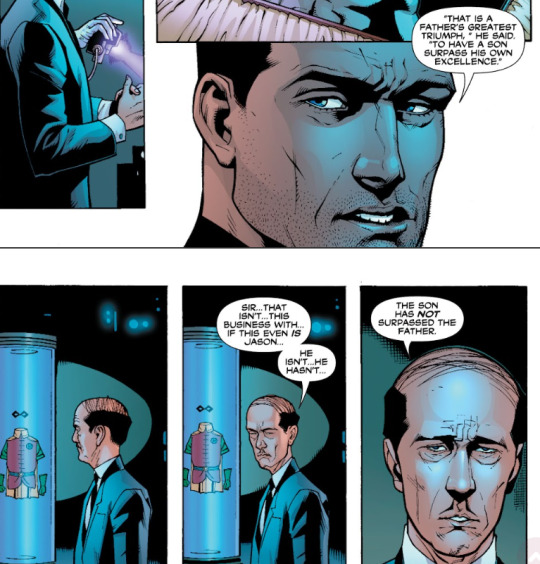
Victim blaming - Jason deserved to die because he didn’t follow orders. Jason deserved to die for not following his training. Jason deserved to die because he was an angry Robin (oh no a child had an appropriate reaction to sexual violence). Jason deserved to die for being human.
Infantilization - Jason is repeatedly infantilized in contrast to Bruce. When given the ultimatum at the end of UtRH, Bruce speaks to Jason like a child, or a bad dog. Ordering him to do things like, “enough!” or “stop this now.” Bruce knows what’s best for Jason (and for everyone in the entire world), we should really just take his word for it and not the victim’s. Imagine staring at a 6 foot wall of a man and scolding him like a child. Beyond that, as mentioned above, his views of love and safety are framed as childish. Even though they are actually leaning more toward collectivism rather than the rampant individualism that Bruce so strongly defers to. (also, just a side note, collectivistic methods in healing from trauma is actually the only scientifically reliable way to heal. Every other method has absolutely abysmal results and higher rates of relapses.)
Silenced and Safety Villainized - Jason is silenced in his own story, acceptable and honored when he was dead and met with vitriol in life. All of the love given to him as Robin turns to ash as soon as he collides with Bruce’s power and morals. I think any survivor can relate to the experience of being told that what happened to them was a long time ago and it’s time to move on. Or even that they’re leveraging their own safety to get what they want in a manipulative way. Regardless of whether or not there was any accountability or justice for the harm done to them. Alfred asks Bruce if he should remove Jason’s memorial in the cave like two seconds after learning of his resurrection because Jason’s methods of securing safety for himself and using his own voice to define his story. Bruce was able to tell Jason’s story when he died. He was able to memorialize, grieve, and ultimately define Jason’s story because Jason wasn’t there to speak for himself. When Jason does speak for himself, he is villainized and literally stripped of his past significance as Robin (or a good victim) by Alfred within seconds. This is reflected in real life with adoptee advocates speaking about how adoption is unethical/harmful/traumatizing and subsequently being framed as ungrateful, selfish, etc. They were little perfect victims without voices before they grew up and could speak for themselves.
Erased - Gestures at the entirety of how Jason is either talked about or completely erased during the 90s Tim Robin run. He wasn’t convenient to talk about, as victims rarely are. This also ties into how Steph’s death was erased and Babs was written like she “won” at trauma by simply... beating it???
Dangerous - Jason is framed as threatening the basic fabric of society (in a story with vigilantes this is hard to do, so they have him oppose the no-kill rule, and then doubled down on Bruce’s characterization of no-killing). Anything that bucks the status-quo is usually marked as villainous in mainstream vigilante/superhero comics, but this is a step beyond that into the interpersonal and political sphere. Hysterical women are often framed as dangerous, villains, snakes, and treacherous (the other side of this coin is weak, pathetic, and pitiable) because they are victimized and then have the audacity to do something to the system about it. Whether that be the system of their immediate families or the political sphere. I don’t think it’s a coincidence that Jason was paired with Talia in Lost Days to hammer this point home to the reader. It could’ve just as easily been anyone with access to the Pit that rescued him, but no, we had DC’s favorite brown, treacherous, venomous, female punching bag.
Bruce Wayne, The Batman
Bruce fits well into the father, enforcer, and logical man slot in Jason’s hysterical story. There is a history of ownership throughout women’s history when it comes to their subjugation to men. Women actually couldn’t be put on trial before the witchcraft genocide because they weren’t seen as legally a person. Their male owner would be put on trial instead. Women would go from being owned by their fathers to their husbands after entering marriage, the most dangerous woman being one who isn’t owned (orphaned, widowed). Bruce does treat (and even thinks) about Jason like he’s something that he owns. He’s his protege, his son, and his responsibility.
The narrative function of Bruce as a perpetrator in Jason’s story.
“The perpetrator asks the bystander (reader) to do nothing. He appeals to the universal desire to see, hear, and speak no evil. The victim, on the contrary, asks the bystander (reader) to share the burden of pain. The victim demands action, engagement and remembering” (Herman).
Bruce does remember what happened to Jason. He keeps a permanent memorial to his dead son. However, this doesn’t translate into any kind of tangible action. He doesn’t do anything to actually stop the murderer who took his son’s life and he continues to throw child soldiers at the problem of crime (how many children have died for the sake of his no-kill rule at this point?). When met with the reality of his inaction, he fits into the perpetrator’s role like a glove:
“In order to escape accountability for his crimes, the perpetrator does everything in his power to promote forgetting. Secrecy and silence are the first line of defense... If secrecy fails, the perpetrator attacks the credibility of his victim. If he cannot silence her absolutely, he tries to make sure that no one listens... From the most blatant denial to the most sophisticated and elegant rationalization... One can expect to hear the same predictable apologies: it never happened; the victim exaggerates; the victim brought it upon herself; and in any case it’s time to forget the past and move on. The more powerful the perpetrator, the greater his prerogative to name and define reality, the more completely his arguments prevail” (Herman).
I think it is simply fact at this point that Bruce is the head patriarch in Gotham if not, arguably, in the entirety of DC. That level of power in the narrative cannot be ignored, especially when faced with the very real, screaming voice of a victim that Bruce uses all of that power to silence. Bruce, because of his status as patriarch, default protagonist, and self-insert for the toxic male power fantasy, has the ultimate power to name and define reality. Especially to the reader. Bruce doesn’t deny what happened to Jason, because that’s physically impossible to do. But what he does do is ensure that no one listens to Jason, discredits him, and rationalizes his own inaction, actions of violence towards Jason, and victim blames.
Here’s Bruce using the most base form of denial and victim blaming:
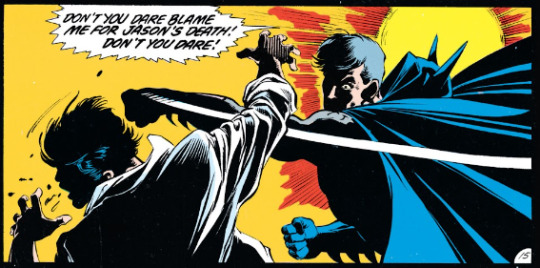

After this panel, Bruce also revokes Dick’s access to his childhood home simply for asking a question.
This theme extends to other members of the batfam because of Bruce’s narrative power over them. It’s why we can’t have Dick, Steph, Babs, or even Damian step in and relate to Jason’s trauma or vindicate him. Even when we, the readers, can see parallels and wonder why these conversations or bonds aren’t forming. Jason HAS to be a lone wolf because he is hysterical and a threat to the system of power. This also shows why most of his runs in group settings outside of the batfam fall apart or fall flat. If he was humanized by any other character or had his trauma validated in any actionable way, it would be recognizing the failure of the toxic male power fantasy. The readers are not supposed to see the flaw in this system that allows the bodies of children to pile up and sympathize with one of their voices. It would be a crack in the system of power that exists not only in the source material, but very much within our real world.
Side note: Jason is allowed to interact with others in a wholesome and validating way when he no longer threatens the systemic power of Bruce. When he is silenced by the writers and plays the “nice victim” (like Babs does), he is allowed connection. Only when his healing is done in a way that doesn’t demand action and is only his personal responsibility (gotta love the rampant individualism). If he is hysterical, demands action, and asks for someone to be held accountable for his death, he is shoved away into a lone wolf box. Examples: Gotham Knights (from my very basic understanding, I haven’t played the game, only seen play throughs) and WFA. Victims are acceptable if they do their healing in a neat little box and stay there, but hysterics are the ones who step outside of that box.
Red Hood, The Political Voice of Hysteria and Trauma
Red Hood is deeply political in terms of hysteria and trauma. Herman stated that victims and those that authentically care for them or listen to them intently (whether that be interpersonally, clinically, or professionally) are silenced, ostracized, and discredited. Survivors need a social context that supports the victim and that joins the victim and witness in a common alliance. On an interpersonal level this looks like family, friends, and loved ones. However, trauma is systemic and the social context mentioned above must also be given on a wider social scale. For this to be done, there had to be systemic change and political action. Jason had the interpersonal social support and witnesses to his trauma ripped from him by Bruce. So, we see him move onto a systemic level of addressing trauma in his own political way. He literally cannot escape Bruce and this constant trigger because of Bruce’s philosophy and just... fucking power to define reality... being re-enforced constantly in DC no matter where he tries to go. So, he tries to heal by taking the systemic issue of perpetrators who cannot be held accountable or have fallen through the cracks of accountability into his own hands in a very personal way. A one man political movement.
Whether his methods are moral or ethical doesn’t really matter in the overall framing him as hysteric. He simply has to be opposed by the male power fantasy in some significant way. This shows that the goals, needs, and work towards victim’s and the marginalized’s freedom is dangerous, doomed to fail, and ultimately unethical if the victim is framed in a villain light instead of the more pathetic/pitiable iteration of hysteria.
You can see how this is not only problematic but also reflects the real world values instilled in arguments against human rights movements (which are intrinsically tied to victims rights). Defunding the police is dangerous, the MeToo movement is dangerous, abolition is dangerous, trans rights are dangerous, etc etc etc. Think of the victims voices tied to each of these movements and how they are integral to the real change offered by these political movements. You can’t have human rights violations without creating victims. And you can’t have political movements surrounding human rights without listening to victims.
We can also see how the individuals within these movements are ostracized, villianized, and often silenced (sometimes ultimately silenced with death) because they rally against the systems of power that victimized them. The framing of traumatized, vulnerable people as hysterical is integral to upholding the system of power that traumatizes and harms them.
A popular comic book movie adaptation that highlights the importance of Jason’s hysterical framing and how it impacts the political narrative/how he is written is V for Vendetta. To be fair, it received an insane amount of backlash by conservatives (not within leftist or liberal spaces) for V’s methods in over throwing fascism, but only because of the movie’s release date being so close to 9/11. V and Jason have many parallels, it’s only the lack of hysterical framing that makes V more palatable to the viewer. We are told, not shown through behavior, that V is traumatized by his past and he does not pick a fight with the protagonist that functions as a toxic male power fantasy. He is the protag, with his version of Bruce being men who are not framed in a sympathetic, heroic, or relatable light.
Additionally, there is literally an unemoting mask standing between the viewer and V, whereas Jason takes off his helmet to allow the reader to see every aspect of his trauma and pain. V readily dehumanizes himself into an idea, rather than a person. Whereas Jason screams to be seen as a person in a very hysterical way. So, we can see how the framing of Jason as hysteric against the logical, heroic man greatly impacts how the audience reads him when contrasted by a very similar political story/character who uses similar (and arguably more violent) methods to meet his ends. (This just made me realize that I would die for a Jason adaptation written by the Wachowski sisters).
Jason’s work as Red Hood is seeped in leftist, victim, and community centered politics. His portrayal as a hysterical antagonist (at best an anti-hero) is rooted in misogyny and upholding patriarchal, capitalist, and the prison industrial complex systems of power. He is the righteous embodiment of “the personal is political” for victims. Even his Robin run draws attention to and shows correct, angry reactions to the system of patriarchal power in sexual violence.
Patriarchal Writing and Enforcement
Jason is girl-coded and hysterical because he’s supposed to be emasculated, discredited, and disliked by the reader. He serves the narrative function of boosting the toxic male power fantasy of Bruce and in doing so, the writers use one of the oldest tropes in the book (one that we have all subconsciously been taught since birth) to get the reader on their side. Make him a hysterical woman.
References: for anyone interested in furthering their understanding of any of the concepts mentioned above and to, you know, use sources for my own writing.
Barstow, A. Witchcraze
Bondi, L., Burman. E. Women and Mental Health: A Feminist Review
Freud, S. The Aietology of Hysteria
Gilman, C. P. The Yellow Wallpaper
Herman, J. Trauma and Recovery
Ussher, J. The Madness of Women.
Van der Kolk, B. The Body Keeps the Score
Wilkin, L., Hillock, S. Enhancing MSW Students’ Efficacy in Working with Trauma, Violence, and Oppression: An Integrated Feminist-Trauma Framework for Social Work Education
#jason todd#bruce wayne#hysteria#dc#meta#clovis writes#listen I regularly have to write 20-30 page research papers on therapy theory and mental health#I'm so sorry this is so long but it is actually impossible to shorten it#one of my profs once said I write in a way that's academic but still readable and know the meaning of brevity#and I was like: sir I've never been accused of brevity before#this took 3 days to write and get my thoughts straight on it#remember: you asked for this lol#holy fuck the word count on this is nearly 5k I'm so sorry#I literally can't proof read this because my brain has shut off from reading this post#there's probably some stuff misspelled and also missing from this but I'm done with it lol
432 notes
·
View notes
Text
i’m pretty sure this was done on the tlt subreddit once before but i haven’t seen it here and i’m curious to know tumblr’s opinions on the topic! personally i like the second two much more than the first—gtn didn’t really grab me that much and i wouldn’t have even called myself part of the fandom until i decided i might as well give htn a go and immediately got sucked in—but i’m guessing that most people’s experience is different, since the first book seems like the most popular based on the impressions i’ve gotten. also feel free to put in tags where you’d rank the short stories (as yet unsent and doctor sex) relative to the books! i would have stuck those in the poll too but there are. 120 different ways to order 5 unique objects
#personally it’s always going to be ayu >/= htn > ntn > dr sex > gtn for me#i do think that gtn might have had a chance against ntn if i had read gtn in the same mindset that i read nona (i.e. already completely 100%#obsessed with the world and characters) but there’s no way either of them could possibly hope to compete with the EXPERIENCE that is htn#and ayu is absolutely perfect for what what it is (character study of judith subtle worldbuilding exercise etc.)#like that short story more than anything else to me is where it’s clear that muir has written fanfic before because in the best possible way#ayu feels like one of those extremely high-quality 10-15k oneshot fics that you read and find your entire life permanently changed by#also the night that story leaked on this website was my destiel night so i will always have a fondness for it tied to that experience#the locked tomb#polls#if this HAS been done on here then i’m sorry and i’m not trying to steal anyone’s thunder! i just really want to know
192 notes
·
View notes
Text
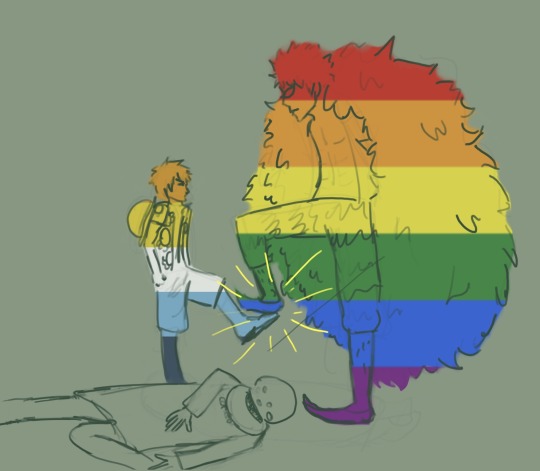
i completely forgot about this one
#yea its the monthly sudden art spam#i know this might have been done before but#we vibe#also sorry for not giving law a flag because i really dont know#i was only 100% sure about luffy#if anyone has a good hc i’ll add that#gay parried meme#peter griffin death pose#aroace#monkey d. luffy#luffy#donquixote doflamingo#doffy#trafalgar d law#law#one piece#one piece fanart#one piece meme#op#dressrosa#sketch#i’m just going to take over the tag from a reblog#gay on gay crime#also happy belated birthday luffy
232 notes
·
View notes
Text
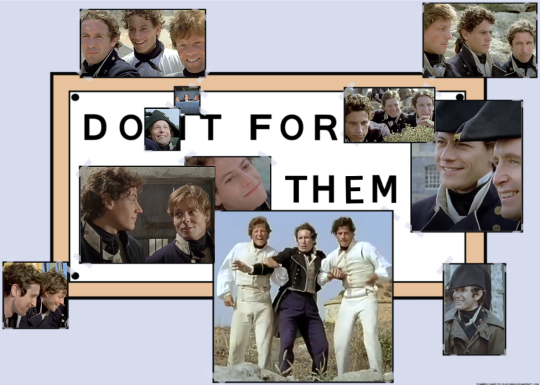
#william bush#archie kennedy#horatio hornblower#hornblower#don't mind me showing up late to the party as usual but. they.#rotating them in my head forevermore#apologies if this has been done before but i haven't come across it yet#i spent. too much time trying to make sure there wasn't any favoritism in the image sizes#archie i'm sorry you're the smallest solo one but you do have the biggest and brightest smile so#so tempted to print this for work but for reasons unknown i've committed to work people only knowing me as the sports nerd so alas#i will carry this in my heart instead
156 notes
·
View notes
Text
Tim Drake, to me personally, is a selective genius. More accurately, he’s just an insanely fast learner when something even mildly interests him (typically something mentioned by Batman and/or Robin). Unfortunately this leads to weird and inconsistent gaps in his knowledge.
Like, for example, and referencing a post about him being unable to work computers I’ve made in the past, Tim learned all about PC hardware because Batman mentioned upgrading the Batcomputers specs once, which was then plastered across forums with the title of like “BATMAN SEEMS TO HAVE THE BUDGET OF NASA, IS THIS WHERE OUR TAX PAYER DOLLARS ARE REALLY GOING?” and Tim wanted to harness the power of the sun to create something similar. This led him down a rabbit hole, and now he can create a super computer from someone’s spare junk drawer. However, when it comes to installing software and actually using the PC beyond its basic functions? Uninteresting. The only reason he learned later on in his Robin career was because Barbra found his lack of ability to hack deeply concerning and decided to remedy it. She provided the proper motivation.
Other weird ass conversations include:
- Was able to deduce the strain of fear toxin that Damian was under, synthesize an antidote, and track Crane down to his warehouse at the Docks district within a three hour time period. (Bruce offhandedly mentioned that they should start writing down the effects of different fear toxins so that they could eventually identify which was which to make antidote administration easier, knowing it’d be an insane and labor intensive task that no one would really do because they were doing just fine currently. Tim promptly created a spreadsheet, copped the cowl footage, and got to work. He learned advanced chemistry for this, promptly bringing his barely passing grade up to an A within two months.)
- Once was able to list the entirety of Haley’s Circus lineup over the years, correctly identifying which performers had been kidnapped by the Court of Owls, yet couldn’t name a single United States president before the year of 2012. (Got embarrassingly into circus performances because y’know, Dick is his hero and so he memorized the entire history of Haley’s Circus so he’d always know who/where/what Dick was talking about when he referenced his time there)
- Word for Word reciting an obscure peace treaty for an ALIEN NATION, but wasn’t able to tell Dick what the Fibonacci sequence was. (Starfire is Tamaranian and Tim assumed that she and Dick would get married one day and he didn’t want to be insensitive so he hacked into the Green Lantern files that all the Earth Lanterns update and got to work researching. Even the stuff that only tangentially mentioned the planet and people)
#dc#batfamily#batfam#Tim Drake#red robin#Batman#robin#This also plays into the ‘I know of no personal boundaries’ bit that Tim has going on#Kid cannot be normal about anything least of all his favorite superheroes#Tim for when Jason’s been somewhat introduced back into the family read the entirety of Jane Austin’s works#He learned everything about ballet that he could for Cass#For Damian he dug so deep into the history of animal rescue and the mechanics of painting#In fact he actually learned everything he could about Goliath’s species so that he could talk to Damian about his new pet#His love language is knowing insanely detailed things about you and your hobbies#Tim ‘I can recite the entire history of this famous painter for Damian but couldn’t be bothered to make it past Calc in high school’ Drake#Tim ‘I know everything about cloning (both in human and our current knowledge of alien tech) so I can make sure Kon’s safe’ Drake#If you can’t tell I’m very much projecting#idk if this has been done before and sorry if it has but this idea has been bouncing around in my head for a while
120 notes
·
View notes
